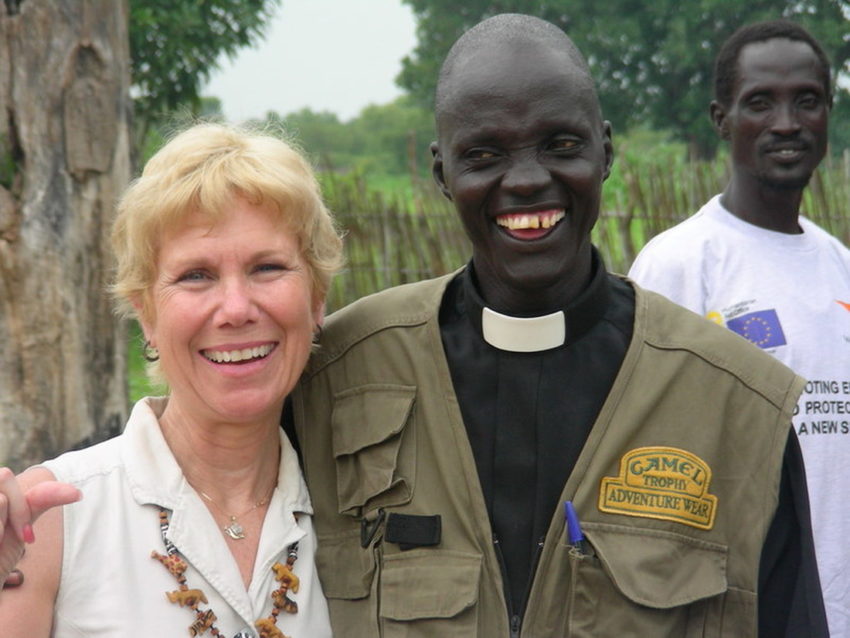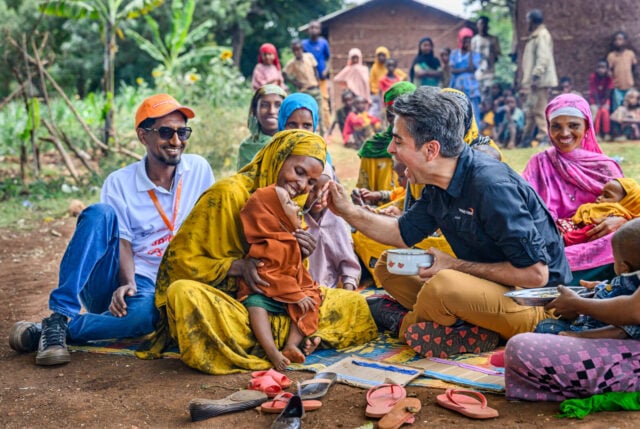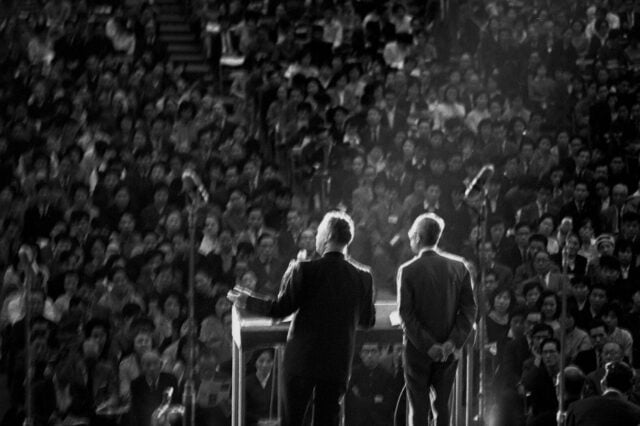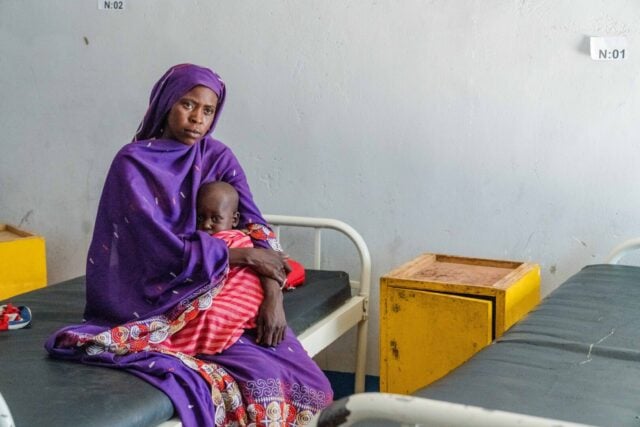The troubling news about the growing violence in South Sudan touches a tender place in my heart and often drives me to my knees. In 2006, I traveled to the jungles of southern Sudan with World Vision. Five years later, in 2011, the area would become the world’s newest nation: South Sudan.
While I was only there a few days, I have never forgotten the extraordinary men and women of God I met. Their courage and faith continue to inspire me to this day.
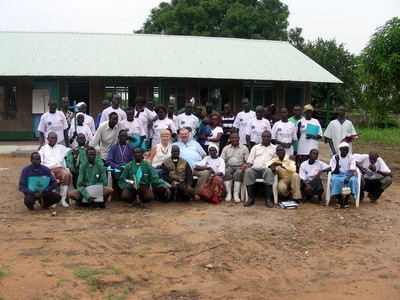
The 22-year conflict between northern forces and the tribes of the south killed more than 2 million people, drove millions more into refugee camps, and destroyed tens of thousands of farms and villages. After a peace agreement was signed in 2005, survivors began to return to their homes, and World Vision immediately established several community development programs to help those returning rebuild their villages and replant their fields. One of these programs was in an area called Thiet.
My husband, Bob, and I were invited to Thiet to participate in a gathering of local pastors and Christian leaders. As desperate and dark as the war years had been, the Spirit of God had moved in the hearts and lives of many South Sudanese through the witness of Christian workers, miraculous interventions, and the power of the gospel.
As a result, small churches were springing up throughout the area. But most of the pastors and teachers had no training or formal education. Some had never held a Bible in their hands. Others used ragged photocopies of New Testament Scriptures to encourage their growing congregations. And some simply shared the good news as it had been shared with them.
Getting there
It took two days and three different planes to get from Nairobi, Kenya, to Thiet. South Sudan has only two seasons — bone dry and monsoon wet — and we were traveling at the worst of the wet season. As we crossed into what is now South Sudanese airspace, I watched the rich green landscape below turn into an endless expanse of watery marshland. A sea of waving green grass and shimmering water stretched as far as the eye could see, reminding me of the Florida Everglades.
As we got nearer to Thiet, the jungle below thickened. Occasionally, the canopy of trees opened to reveal a clearing with a number of small, thatched-roofed, mud huts called tukuls clustered in twos and threes. Other clearings were obviously man-made but empty. Whatever had been there had been destroyed during the war.
Finally, our little eight-seater bush plane descended over a strip of brown dirt in the center of an open field. Water was pooled on the first third of the make-shift “runway,” and as we took an exploratory buzz over the field, a grazing donkey looked up at us without concern.
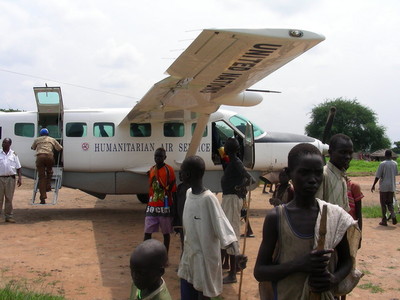
I heard one of our staff mumble, “We can’t land on that.” But to my relief, the pilot made a circle and descended once again. With perfect precision, he skimmed the wheels over the top of the water, touching down on the dry land on the other side. Then he immediately hit the brakes, bringing us to a screeching halt within feet of the end of the strip. We all broke into applause as the door popped open and a group of villagers and children swarmed the plane to greet us.
We piled into the World Vision vehicle waiting for us and drove over roads pitted with muddy holes and strewn with rocks. We passed through the village of Thiet, which was bustling with people eager to get their business done and get home before the rain-heavy clouds gathering in the distance arrived.
Our route took us through fields of corn, wheat, and other produce World Vision had helped the farmers plant. To my inexperienced eyes, it appeared that the crops were doing well. But one of the staff explained that many things could still go wrong. Too much rain. Too much hot sun, even pestilence. And if the harvest went well, it would be several years before the local farmers would be able to grow enough food to feed everyone because many families had returned to the area without husbands to work the land.
In response to this need, World Vision had established a food center and clinic where mothers bring their children to be weighed, measured, and treated for medical problems. Then each child was given enough food to last for a week, ensuring that the women would bring their children back regularly for nutritional assessment.
We arrived at the World Vision staff compound just before the afternoon downpour. Within minutes, the hard-packed earth outside of our tukul became a lake, and I understood why the staff had insisted we bring mud boots even though the temperature during the day would rarely go below 100 degrees.
Fruitful fellowship
The next morning, we were up with the sun. When we arrived at the church where the conference would take place, there were 35 pastors and lay workers eagerly waiting to greet us. Some had walked for three days to learn from us and become equipped to better shepherd their churches, strategize with other Christian leaders, and go deeper in their own commitment to Christ.
Each day started with prayer and praise. Then either World Vision’s Daniel Muvengi or I shared the morning teaching. After lunch, there was another teaching session before the group split up to discuss what they had heard. Then we all came back together to sing some more and finish with prayers and thanksgiving. While I rarely understood their words or their songs and prayers, I had no problem understanding their hearts.
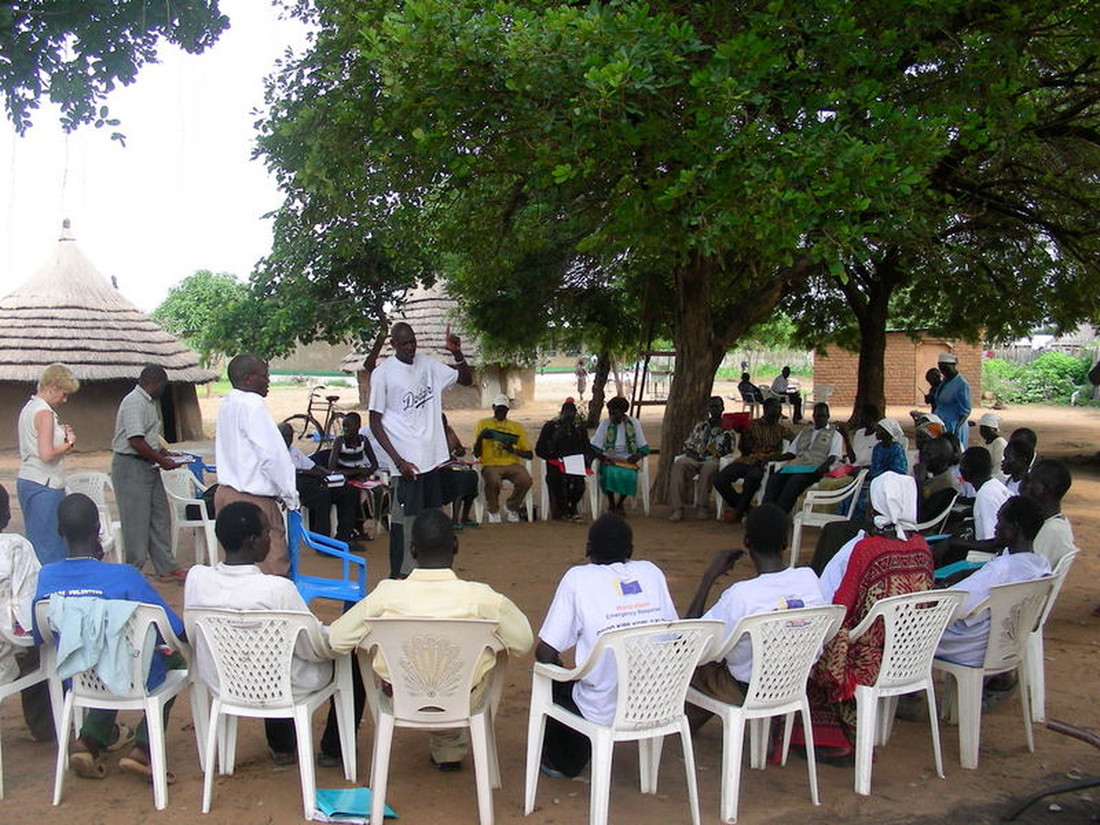
The attendees slept on the floor of the church, and World Vision provided all the meals. After dinner, we sat and talked as the evening slowly cooled and the stars came out. It was during this time that Bob and I learned the story of Robert, our very tall and delightful interpreter, and his equally majestic sister, Miriam.
The siblings had been little more than toddlers when a band of soldiers came roaring into their small village with guns blazing. Their mother had picked them up and run into the jungle, hiding as other women and children were murdered before their eyes. Then their father was bound and loaded into a truck with other men and boys to be sold as slaves in the north. They never saw him again.
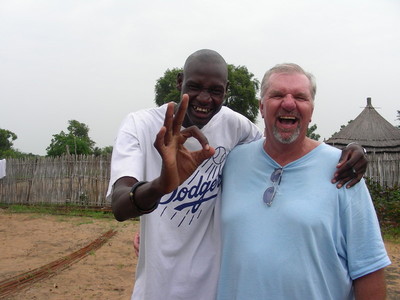
Somehow the three made it safely to relatives in another village. But nowhere was safe for long, and eventually, they joined millions of other refugees who had to flee for their lives. They ended up in a refugee camp where they lived until it was safe to return.
I do not remember whether Robert and Miriam’s family were Christians before the soldiers came or if they heard the gospel for the first time while they were living in the refugee camp.
But I do remember looking at their beaming smiles and fighting to hide my tears as they both declared how good God had been to them through the years. They gave him glory for keeping them safe and well and fed. But most of all, they thanked him for bringing them home.
Being there
During our visit, Bob and I heard many similar stories of great loss and greater hope. In the face of all these people had endured, I often felt like our teachings were far too simple for their great faith. But then Robert would catch me up in a hug and say, “Mama, we are so grateful you have come!” and I realized that being there was our most meaningful message.
At times we found ourselves caught off guard by the pastors’ questions. I remember one older gentleman standing with great dignity to declare, “We would like to know when we should celebrate Christmas.”
He went on to explain that they celebrated on December 24, but they had heard of other Christians who celebrate on different dates. “Please tell us when Jesus was really born and when we should celebrate Christmas.”
At first I thought the dear old man might be joking, for these were a people who loved to laugh. But the serious expressions on the faces waiting for my reply made it clear that this was a question of real concern. Humbled by their trust, I had to admit that I wasn’t an expert on such things, but I was sure Dec. 24 was fine with God.
Only later did the importance of the question hit me. These were people who had lived with the spirit of death hovering over them for more than 20 years. Now they wanted — they needed — to celebrate the coming of the Spirit of Life. To them, the birth of the Christ child was not just something to put on a Christmas card. It was the most profound moment in history, and they didn’t want to get it wrong.
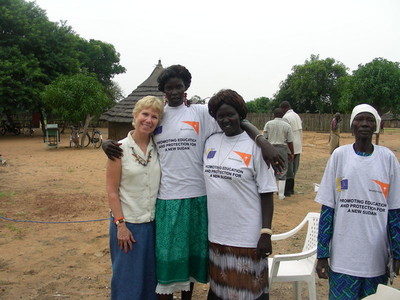
From soldier to believer
Other questions challenged me in my own walk of faith. “Why is it that when we pray for God to heal someone, they aren’t always healed?” asked Pastor Joseph, a man with the scars of a soldier and the smile of a saint.
This was a question I had asked God myself on a number of occasions, and no easy answer came to mind. So I answered out of my heart, saying that this is where the walk of faith comes in. If we believe that God is truly a loving Father, then we must also trust that he knows what is best for his children. But just because occasionally our prayers don’t appear to be answered, that doesn’t mean we ever stop asking.
The collared man of God took a moment to ponder, then nodded as though satisfied with the answer.
We would later learn that Pastor Joseph knew firsthand about the loving interventions of his heavenly Father. As a boy, soldiers took him after forcing him to watch them kill his entire family because they were Christians. They put a gun in his hands and taught him to kill without mercy. Over time, all the good and loving things his parents had instilled in him seemed to drain from his soul.
Then one day an Anglican priest walked into the dusty village where he and a group of soldiers were staying. The man had no gun and seemed totally at ease as he squatted by their fire, talking with them about Jesus. Amazingly, no one objected. Instead, they listened, and as the man talked, Joseph felt something deep in his spirit crack open.
“When he left the next day, I laid down my gun and followed him,” he told us on our last night together. “I have been following Jesus ever since.”
A leap of faith
The morning we were to leave, Bob, Daniel, and I were sitting in the compound having our morning coffee and listening for the distant engine drone that would announce that our plane had come.
Suddenly, we saw Pastor Joseph riding toward the compound on his bicycle. He had been shot in the leg during his days as a soldier and walked with a severe limp, so the bike was the only way he could get around. As he approached, I saw that his usual smile had been replaced with a serious expression. Before saying a word, he pulled up his pant leg to show us his scarred and unusually thin leg.
“I would like you to pray for my leg before you go,” he said.
I was certain that leg had been prayed for many times in the past without result, but Pastor Joseph was taking another step of faith in his walk with Jesus. And as we put our hands on that leg and prayed, we took a leap as well.
I never heard whether Joseph’s leg was miraculously healed, but as I recall our time together, I know that I was changed forever. We went to Sudan to bring a deeper knowledge of God’s Word and encouragement to his people. But in the end, they were the ones to teach and encourage us, because long before we came, God was there.
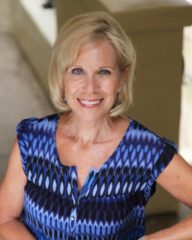
Marilee Pierce Dunker travels the world as an ambassador for World Vision, the organization her father, Bob Pierce, founded in 1950. Like he did, she shares stories, pictures, and personal reflections, bearing witness to the extraordinary ways God is using his people to share the gospel and care for the poor.
Visit World Vision’s Speakers Bureau site to request Marilee or another World Vision speaker to present at your upcoming event.
